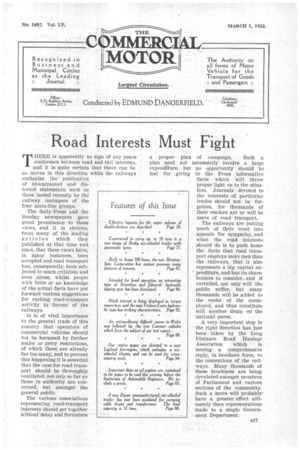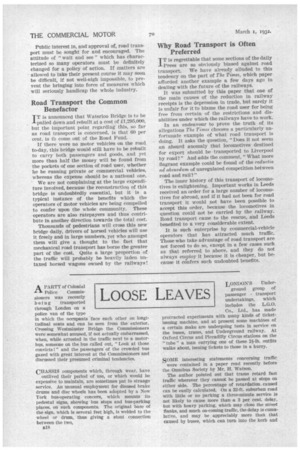Road Interests Must Fight
Page 35

Page 36

If you've noticed an error in this article please click here to report it so we can fix it.
THE.RE is apparently no sign of any peace conference between road and rail interests, audit is quite certain that there can be no moves in this direction while the railways authorize the publication , of unwarranted and dis torted statements, such as those issued recently by the railway Managers of the four main-line groups.
The daily Press and the Sunday newspapers gave great proniinence to these views, and it is obvious, from many of the leading articles which they published at that time and since, that these views have, in many instances, been accepted and road transport has, consequently, been subjected to much criticism and even abuse, whilst people with little or no knowledge of the actual facts have put forward various suggestions for curbing road-transoort activity in favour of the railways.
It is of vital importance to the general trade of this country that operators of commercial vehicles should net be harassed by further major or petty restrictions, of which there are already far too many, and to prevent this happening it is essential that the case for road transport should be thoroughly ventilated, not only so far as those in authority are Oncerned, but amongst the general. public.
The various associations representing road-transport interests should get together Withou delaY and -formulate a proper plan of campaign. Such a plan need not necessarily involve a large expenditure, but no opportunity should be lost for giving to the Press informative facts which will throw proper light on to the situa tion. Journals devoted to the interests, of particular trades should not be forgotten, for thousands of their readers are or will be users of road transport.
The 'railways are putting much of their trust into appeals for sympathy, and what the road interests should do is to push home the facts that road transport employs mord men than the railways, that it also represents a big capital expenditure, and has its shareholders to consider, and if curtailed, not only will the public suffer, but many thousands will be added to the ranks of the unemployed, and thus constitute still another drain on the national purse.
A very important step in the right direction has just been taken by the Long Distance Road Haulage Association which is issuing a comprehensive reply, in brochure form, to the contentions of the railways. Many thousands of these brochures are being circulated amongst members of Parliament and various sections of the community. Such a move will probablyhave a greater effect ultimately than representations made to a single Government Department. Public interest in, and approval of, road transport must be sought for and encouraged. The attitude of "watt and see" which has characterized so many operators must be definitely changed for a policy of action. If matters are allowed to take their present course it may soon be difficult, if not well-nigh inipossible, to prevent the bringing into force of measures which will seriously handicap the whole industry.




































































































